
OSCAR TORRE ACTOR/FILMMAKER
.
FC: How did you begin acting?
OT: I kind of fell into acting. I had one elective class needed in college before graduating and my girlfriend at the time signed me up for an acting class as a joke. I ended up catching the acting bug after doing an exercise in class that felt very real and personal to. It also scared the hell out of me. It was a real natural high.
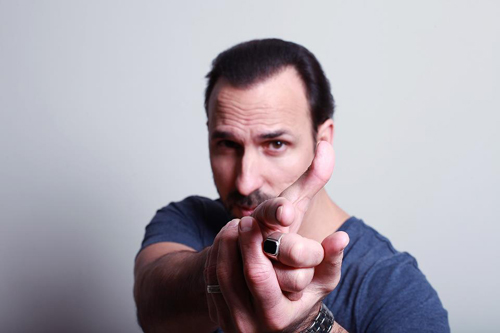
.
FC: What was your first LA audition, what happened and what was your impression of the entire process?
OT: My fist LA audition was a few weeks after I moved to LA from Miami and I remember having a terrible cold. It was for a play in Chicago. I ended up booking the play and a month after having moved to LA, I found myself flying to Chicago in November, with clothing that I would normally wear in Miami. I froze! It was also an affirmation that I could work in LA – although I had some rough times trying to find work after that.

Chuti Tiu and Oscar Torre on the set of PRETTY ROSEBUD
OT: When we started going out about 10 years ago (we are now married), she gave me the script to read and I remember loving it. It was well written, with very good characters that weren’t stereotypical and at the same time felt very flawed – real. I told her that I would love to play one of these roles. At the time, I had no idea that I would end up directing it. It was years later (while we were looking for a director) that I told Chuti, I think I can direct this and she said yes, please do.
OT: Just like when I act, I do a lot of research but as a director, multiply the research by a 100. I looked at every film that had a similar theme or might even have one scene that resembled a scene in our film. I also listened to many director’s commentaries on DVD’s and read everything I could about directing. I also had the benefit of having been on many sets as an actor and paying attention to what the directors were doing. I also started thinking about the directors I had enjoyed working with and what it was that I liked about them and even more importantly, when things didn’t workout all that well during a shoot, why and what are the steps I could take to avoid that.
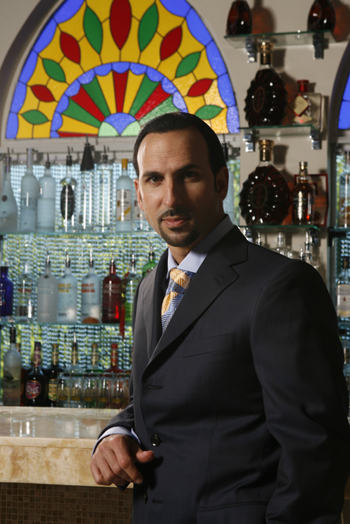
FC: How is it to direct someone you know so well and still maintain the integrity of the character?
OT: I wasn’t sure how it would be but in our case I think it was definitely a plus. Whenever I had a question about the writing, all I had to do was look across the room and ask. The integrity of the character was never in question because on set, while we were shooting, she was just another actor who also happen to have written the script. We were also striving for the same thing, to make the best film possible.
OT: I had discussed beforehand with Tarina Reed, (my director of photography) how I planned to shoot the scenes – so the moment I was acting, I wasn’t thinking about the shot. Then I would go and look at the monitor (to review the scene) between takes and make adjustments but it’s not an easy task. It’s hard to be objective and not to take into account how I felt during the scene ,which at times, is not a good indication of the performance. One of the benefits of also being the director is that I could give myself as many takes as I want but in reality, at some point you have to have faith that you got the shot and just move on.
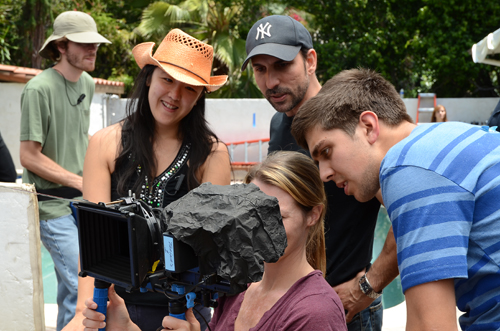
.FC: How do you direct an actor to bring a character to life and not play it flat? How did you bring “Cissy” to life?
OT: I think you first start with a solid script and then you cast the right people for the job. As a director you need to be careful to not over direct . You could end up driving actors crazy and confusing them. I think every actor is a piece of the puzzle; therefore one thing I did to make sure we were all on the same page was to post a series of questions, that I e-mailed the actors once they were cast. These questions were specific to their characters. I didn’t care to know their answers, I just wanted them to think about these things. It also stirred the actors in the direction I wanted them to go, while leaving it open to their creativity. In the case of Chuti (Cissy), she wrote the script – she knew the character well and I also knew she was well prepared because I would see her at home locking herself in the room for hours at a time, working on Cissy. We also had many conversations and like with the other actors, I posted questions of things she should think about. At times, when necessary, I gave adjustments during the scene without yelling cut. If I liked what I was seeing and didn’t want to break the moment but needed to make an adjustment, I would talk to the actors during the scene. They soon got used to me doing this. This was something I saw Pedro Almodovar doing with Penelope Cruz, while looking at the behind the scenes of one of his movies. I thought it was an effective technique. The actors knew to hold the moment and not to look at me, while I was giving directions during the scene.
FC: Who is ‘Alejandro’ in PRETTY ROSEBUD? How much are you bringing parts of yourself to the role? How much of it is a composite of others you’ve known?
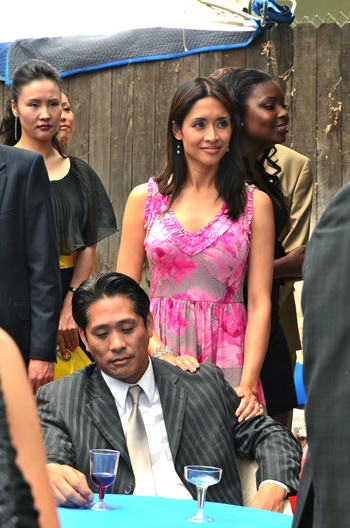
Chuti Tiu and Kipp Shiotani on the set of PRETTY ROSEBUD
OT: Alejandro is an ex-boxer, who at some point fought for the world title but was knocked out. He is now Cissy’s personal trainer at the gym she attends. I always bring part of myself to a role. I ask myself, “what do I know about this?” I’m also intrigued (which for me is always a good place to start when prepping for a role) by someone who chooses boxing/fighting as a way to make a living. What motivates him? What kept him on his feet when being hit by another man who wanted to knock his head off? What makes you fight back and how do you deal with loss? Those are all questions I asked myself and I look to see how that relates to my life. I also felt that Alejandro and Cissy are not very different, except his scars are visible.
FC: Can you please share a story of a director whom you had previously worked with and wanting to emulate his/her style of shaping the cast and crew?
OT: I’ve been blessed to have worked with directors that I really liked their style and how they behaved on set. The directors I really enjoyed working with were pretty cool under pressure. Shooting a film can be very stressful and when you see a director losing it, screaming, etc., you start questioning in which direction the ship is sailing. On the other hand, when I saw a director who seemed confident – everyone around them doesn’t start questioning what he is doing. So when in doubt, fake it. That doesn’t mean that you don’t ask for input of those people who you trust but ultimately, it is the directors decision and when it stops being, you’re in trouble. The crew can quickly smell blood in the water and they start losing faith in the project. When dealing with actors, being one myself, I’ve always enjoyed directors who made me feel like I can take chances and that I’m the best actor in the world. When an actor feels confident, they tend to relax and it shows in their work. They’re not afraid to make mistakes because they feel like they can’t fail, that they have a fan in the director. Having said that, I also didn’t tolerate any behavior that was unprofessional and luckily I didn’t have to deal with that very much but when I caught a glimpse of it, I stopped it before it even got started. I treated all the actors/crew with respect, regardless of their status or credits. After all, we were all here for the same thing – to make a good film.
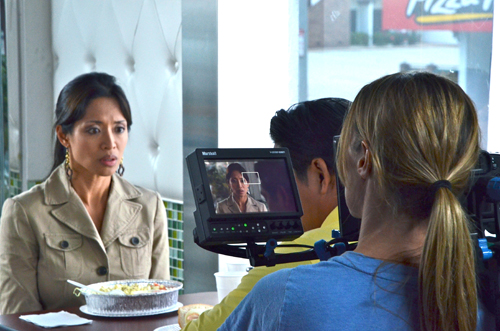
FC: We’re hearing much these days about the role of the Multi-Hyphenate in entertainment. In the big scheme of things doesn’t that water down one’s talents or is it essential in staying afloat?
OT: I don’t think it waters down the talent. In the contrary, at least in my case, I’m a better actor now from having directed and a better director from having acted. It’s just another expression of the art. Many painters are also sculptors, one doesn’t take away from the other, sure, maybe you’re better at one than the other but as long as you’re putting in the work, it doesn’t take away. It just means you have to work harder but if it were easy, everyone would do it.
And essential to staying afloat? It doesn’t hurt to create your own work. Why wait for someone else to give you a job, if you can make it happen yourself. Also, as an actor, as I get older, I might be limited by the roles that I could play but I could always direct – Clint Eastwood is a great example of that.
FC: Can you share your idea of a passion project versus one that is a sure bet monetarily? What differs about the content in each one?
OT: I can only speak about my personal experiences and the films that I’ve been involved in as a producer (Libertad and Pretty Rosebud, as well as Lunarticking, another film that I’m trying to get financing for) they are all passion projects. I’m motivated by something I want or need to say with the film, rather than by how much money they can make. Having said that, I want the films to be seen by as many people possible and for them to be financially successful but that has never been the starting point for me.
FC: What has been your most challenging, but rewarding role and why?
OT: I would have to say both Libertad and Pretty Rosebud. Libertad was my first lead role in a film and was a project that once I was cast, I got involved with every aspect of the producing from seeking money to casting. It was also a film that felt very personal to me. I was playing a political prisoner in Cuba and my grandfather in real life had spent 11 years as a political prisoner in Cuba. He had lived through many of the things my character experiences in the film. The film was shown in sold out theaters in Miami and LA. People would come to me after the film and hug me and share their own stories of how a loved one or themselves had gone through a similar experience. It was very rewarding to be part of something that moved people that way. In the case of Pretty Rosebud, my wife Chuti wrote the script and stars in the film and it’s my first directing job. There is something very rewarding in seeing your vision come to life, one shot at a time. Then viewing it on the big screen, with an audience and seeing people being moved by the story. Chuti and I joke that this is like our child – we raised it, not sure what the child is going to look like when it grows but you have such high aspirations for the child and regardless of what people think, you love the child and you hope that people feel the same way.
FC: Is there a personal mission statement that you live by? How has this mantra or idea shaped your life and career?
OT: I guess I have a few quotes that stuck with me and shaped me. One is something along the lines of, “Successful people do what they have to do, unsuccessful people do what they want to do. ” Another thing is that I try to do at least one thing everyday that moves me towards the direction of my goals. That could be from reading a book, to sending an e-mail, to watching a film. Just keep moving forward.
FC: Of your numerous acting credits, two producing credits, and now a directorial debut, which one had you leaving the set convinced you were in the right place, living what you were meant to do creatively?
OT: Acting and directing are two things I am passionate about. I feel more alive while I’m doing it.
FC: What’s on the creative horizon for you, Oscar?
OT: I am going to direct a short film that I wrote and plan to act in it as well. It’ll be just me and Chuti. It’s called Man/Woman. I also have several films that I’m playing lead roles in, that if everything goes on schedule, I should start shooting them in the summer but I’m not allowed to say much about them. I also played one of the lead roles in the film #EM3, that has just been released. You can now find it on RedBox. We are also are having in April, Pretty Rosebud Tugg screenings in Utah, Miami, LA and in the first week of May in Chicago and Milwaukee, then at the end of May, we are playing at the Big Island Film Festival in Hawaii.
Oscar Torre is a Miami born actor best known for his breakout role in the CBS TV series “Cane,” where he played the role of Santo alongside an all-star cast that included Jimmy Smits, Rita Moreno, Nestor Carbonell, and Hector Elizondo. He also garnered rave reviews for his comedic performance in the Lionsgate film, “Ladron Que Roba a Ladron” ( “To Rob A Thief.” ) The film, directed by Joe Menendez, was at the time, the highest grossing opening weekend for a Spanish speaking film.
Before “Ladron,” Oscar received critical acclaim starring as a Cuban political prisoner in the film “Libertad,” directed by Norton Rodriguez. His first major on-screen role was in Artisan Entertainment’s “Suicide Blonde,” directed by Eduardo Carrillo. Shortly thereafter, Oscar starred as Antonio D’Amico (Gianni Versace’s longtime companion) in the film “The Versace Murder” with Franco Nero and Steven Bauer (“Scarface.”)
Oscar has guest starred on FOX TV’s hit series “Dollhouse,” written and directed by Joss Whedon (dir. of “The Avengers”), and in CBS’ top-rated shows “NCIS” and “Cold Case.” He will also be seen soon in the films, “Magic City Memoirs” with Dominik Garcia-Lorido ( “Magic City – series” ) and Julio Mechoso ( “The Legend of Zorro,” ) directed by Aaron Salgado and starring in the independent thriller “Legacy,” directed by Stephen Savage. Oscar most recently guest starred in an episode of “CSI Miami” and did a cameo in the film” Unknowns.”
Oscar recently made his directorial debut with the feature film “Pretty Rosebud,” that was written and starred by his wife Chuti Tiu. His two latest credits are starring roles in the boxing film, “Counterpunch,” with Alvaro Orlando and Danny Trejo (Machete) dir. by Kenneth Castillo and “Eenie Meenie Miney Moe” directed by Jokes Yanes.
CONNECT WITH OSCAR:
Twitter
Facebook
OscarTorre.com
IMDB
Pretty Rosebud Official Site
























